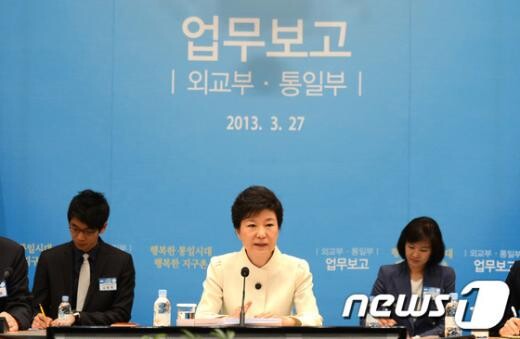hankyoreh
Links to other country sites 다른 나라 사이트 링크
Flickers of hope that Park’s N. Korea policies could calm tensions

By Park Byong-su, staff reporter
Mar. 27 work report from the Ministry of Unification and Ministry of Foreign Affairs gave a clearer picture of President Park Geun-hye’s policies on North Korea. Including as key elements a “two-track” approach of dialogue and pressure and a “trust-building process,” the new conception has attention focusing on what specific policies the new administration will adopt in the months ahead.
The two-track approach is not a first. Both the Kim Dae-jung and Roh Moo-hyun administrations also split their tracks, in their cases by separating political issues from economic ones. The idea was to find solutions on political and military concerns such as the North Korean nuclear program, while also addressing economic matters and cooperation. The two administrations’ inter-Korean summits were the result of this approach, but they ended up being blasted by conservatives as “handouts” to North Korea. Under Park’s predecessor, Lee Myung-bak, the nuclear issue was linked to inter-Korean cooperation. But his “Vision 3000,” which made denuclearization a precondition for cooperation, ended up sending inter-Korean relations over a cliff.
Park’s two-track strategy more closely resembles Lee’s approach, with less emphasis on dialogue and more on strengthening South Korea’s deterrent against the North and applying stronger sanctions amid provocations such as North Korea’s most recent nuclear test. Indeed, Park took a positive view on sanctions at a briefing the day before, saying it was necessary to “make [North Korea] realize it must pay the price for its provocations.”
But the administration also indicated hopes of improving relations through a trust-building process. For this, it is considering a three-stage approach: humanitarian aid, followed by low-level economic cooperation and finally large-scale infrastructure investment. The first two stages would not be tied to the nuclear issue, while denuclearization would be linked to the third stage and discussions on large-scale investment - a kind of compromise between the Kim and Roh administrations’ version of the two-track approach and Lee’s emphasis on the nuclear issue.
Progressives and the political opposition to Park’s Saenuri Party (NFP) are expressing high hopes for the administration’s conception. Park Ki-chun, floor leader from the Democratic United Party, said at a party supreme council meeting on Mar. 28 that the Korean security situation was “on thin ice” and expressed his belief that the administration’s message of “aid first” would send a “more meaningful signal of peace.” Kim Chang-soo, policy coordinator for the Korea Peace Forum, commended Park for “sending a message of dialogue at a difficult time, saying she is willing to consistently respect the existing inter-Korean agreements and set a trust-building process in motion.”
The question is how to get dialogue going at a time when tensions between North and South are high. The administration started off the trust-building process on Mar. 22 by approving the delivery of tuberculosis medicine from the Eugene Bell Foundation, but the next real steps will have to come after the military standoff has softened somewhat. Minister of Foreign Affairs Yun Byung-se was cautious in remarks delivered at a Mar. 28 luncheon with reporters. “In the broader scheme of things, all policies are inevitably impacted by the external and internal environments,” he said. “We’ll have to watch for changes in those environments and update as we go along.”
[%%IMAGE2%%]The Foal Eagle exercises by the South Korean and US militaries, which served to deepen the military antagonisms, come to an end at the end of March. Meanwhile, North Korea is preparing for a plenary session of its Workers’ Party politburo around the same time, with a Supreme People’s Assembly meeting scheduled for early April. South Korea is gearing up for a foreign ministers’ summit this month and a meeting between Park and US president Barack Obama in May. Some observers are hopefully venturing that some positive steps toward a turnaround may be made in the process.
Please direct questions or comments to [english@hani.co.kr]

Editorial・opinion
![[Column] Has Korea, too, crossed the Rubicon on China? [Column] Has Korea, too, crossed the Rubicon on China?](https://flexible.img.hani.co.kr/flexible/normal/500/300/imgdb/original/2024/0419/9317135153409185.jpg) [Column] Has Korea, too, crossed the Rubicon on China?
[Column] Has Korea, too, crossed the Rubicon on China?![[Correspondent’s column] In Japan’s alliance with US, echoes of its past alliances with UK [Correspondent’s column] In Japan’s alliance with US, echoes of its past alliances with UK](https://flexible.img.hani.co.kr/flexible/normal/500/300/imgdb/original/2024/0419/2317135166563519.jpg) [Correspondent’s column] In Japan’s alliance with US, echoes of its past alliances with UK
[Correspondent’s column] In Japan’s alliance with US, echoes of its past alliances with UK- [Editorial] Does Yoon think the Korean public is wrong?
- [Editorial] As it bolsters its alliance with US, Japan must be accountable for past
- [Guest essay] Amending the Constitution is Yoon’s key to leaving office in public’s good graces
- [Editorial] 10 years on, lessons of Sewol tragedy must never be forgotten
- [Column] A death blow to Korea’s prosecutor politics
- [Correspondent’s column] The US and the end of Japanese pacifism
- [Guest essay] How Korea turned its trainee doctors into monsters
- [Guest essay] As someone who helped forge Seoul-Moscow ties, their status today troubles me
Most viewed articles
- 1[Column] The clock is ticking for Korea’s first lady
- 2Samsung barricades office as unionized workers strike for better conditions
- 3[Correspondent’s column] In Japan’s alliance with US, echoes of its past alliances with UK
- 4After 2 months of delayed, denied medical care, Koreans worry worst may be yet to come
- 5[Column] Has Korea, too, crossed the Rubicon on China?
- 6Hong Se-hwa, voice for tolerance whose memoir of exile touched a chord, dies at 76
- 7US overtakes China as Korea’s top export market, prompting trade sanction jitters
- 8All eyes on Xiaomi after it pulls off EV that Apple couldn’t
- 9[Photo] Smile ambassador, you’re on camera
- 10[News analysis] After elections, prosecutorial reform will likely make legislative agenda